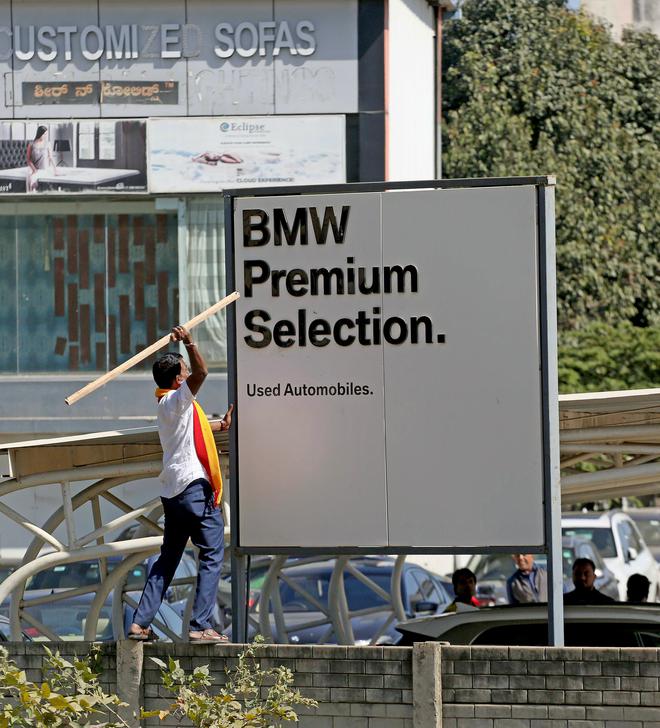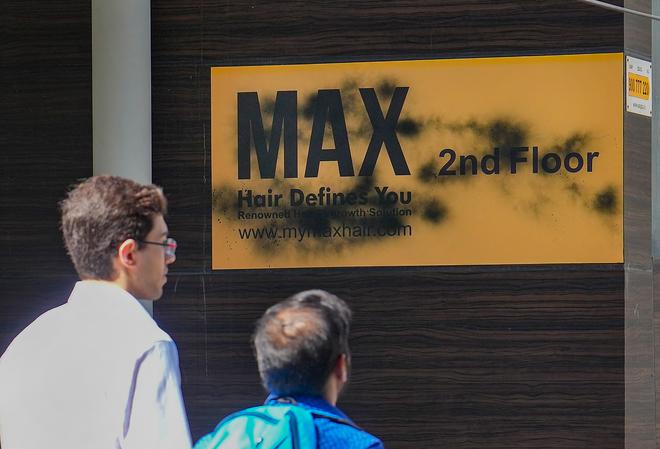The story so far
Bengaluru, a pivotal centre for IT-related services that draws professionals from various parts of the country, has long wrestled with the nuanced issue of language preference. The city’s varied linguistic environment has, at times, resulted in tensions.
Bengalureans, especially its retailers, were shocked to see mobs descend to the streets vandalising non-Kannada signboards last week. This was preceded by an announcement by the city’s civic body that all sign boards should have at least 60% Kannada and the rest in any language and set a February 28, 2024 deadline to implement the same. However, a Kannada organisation Karnataka Rakshana Vedike (KRV) took to streets to “enforce” this rule on December 27. The situation grew tense as some resorted to vandalism.
What is the confusion over rules?
Many retailers and commercial establishments were taken aback by the civic body’s announcement of implementation of the sign board rule by February end next year, and said they were not even aware of such a rule being in existence, as earlier attempts by the State government to implement such a norm had faced legal hurdles.
For instance, Retailers Association of India wrote to Chief Secretary of Karnataka, Rajneesh Goel, seeking his “urgent intervention” to stop any further acts of vandalism and violence against retail outlets in the city. They further claimed that hearing a writ petition RAI filed in the High Court of Karnataka in 2019, the Court had granted a stay order on the 60% Kannada in signboards rule.

What is the history of this tension?
The tussle between the government keen on mandating Kannada usage in signboards and commercial establishments trying to resist it has a long history in Bengaluru.
Back in 2008, rules were framed under the Karnataka Shops and Commercial Establishments (Amendment) Act. Rule 24-A said that Kannada should have prominence on the name board of a business establishment. Rule 26 provided for a fine to be imposed if Rule 23-A was not followed. Followed by this, in 2009, the Supreme Court had dismissed a plea by the Karnataka government to mandate use of Kannada on sign boards. However, notices continued to be issued to shops and retailers to display sign boards in Kannada.
The State’s implementation has not been taken well by all retailers and companies. In the same year, Vodafone Essar South filed a writ appeal in the Karnataka High Court. In the case of Vodafone Essar South vs State of Karnataka, the Karnataka High Court had prevented the State government from mandating language use for shops and establishments. The State had claimed that the Labour Department could enforce Kannada usage on signboards under Rule 24-A of the Karnataka Shops and Establishments Act, 1961.
However, in 2018, the then city mayor R. Sampath Raj had directed shops to display boards predominantly in Kannada, with a stipulation that it must cover two-thirds of the space while leaving the remainder for other languages. The BBMP went as far as warning that failure to comply with these instructions could result in the revocation of trade licenses for establishments. This move by the civic body triggered controversy as establishment owners argued that without a policy in place, the BBMP’s decision might not be held up in a court of law. Challenging this RAI went to the High Court and got a stay order on the same move in 2019.

How is the government implementing the rule now?
Following repeated failures to ensure usage of Kannada in signboards in the state through Rule 24-A of the Karnataka Shops and Establishments Act, 1961, the State government took another route.
Kannada Development Authority, statutory body for the development of the language, submitted a draft of a legislation for implementation of Kannada language use in the State and its holistic development in 2021. The Karnataka Legislative Assembly and Council passed the draft bill in 2022 and The Kannada Language Comprehensive Development Act, 2022, was enacted.
Section 17 (6) of this Act states: “The Rule states that the upper half portion of boards displaying the names of commercial, industrial and business undertakings, trusts, counseling centres, hospitals, laboratories, amusement centers and hotels etc., functioning with the approval and sanction of government or local authorities, shall be in Kannada and the lower half can be in any other language.”
KRV took up a campaign to implement this rule under the new law for the past three months. KRV activists have been going to various malls, shops and commercial establishments asking them to change their sign boards to those where Kannada is used prominently. However, given they did not receive an encouraging response, they announced a protest on December 27 and also met chief civic commissioner of the city Tushar Giri Nath appealing to him to implement the rule.
Following this, BBMP set the February 28, 2024, deadline directing commercial establishments to change signboards accordingly as per Section 17(6) of the The Kannada Language Comprehensive Development Act, 2022, which unlike earlier attempts has not been challenged legally.
On December 25, chief minister Siddaramaiah, who started his political career as the chairman of Kannada Kavalu Samiti, the precursor of Kannada Development Authority in 1983, expressed his support for implementation of the rule.
“We consider not only those who have been born here, but all those who have come here to eke out a living as Kannadigas. In Karnataka, Kannada gets the first priority. It is everyone’s duty to respect the law of the land where they earn a living. In order to promote Kannada in the State, it has been made mandatory to use 60% Kannada in sign boards of all commercial establishments. February 28 is the deadline for this. Follow the rules and be a proud Kannadiga,” he wrote on social media X.
A protest that degenerated into vandalism
The next day, KRV started a protest against non-Kannada sign boards which degenerated into vandalism. The intensity of vandalism was notably high on the International Airport Road. There were also reports of vandalism from Central Business District, K.R. Puram, Rajajinagar, Chickpet, and Mysuru Road.
City Police have till date booked 13 cases and arrested nearly 60 KRV activists including its president T. A. Narayana Gowda, who led the protests. Protests have continued in the city demanding the immediate release of Mr. Gowda.
What necessitates Ordinance?
Meanwhile, Mr. Siddaramaiah held a high level meeting to implement Kannada in sign boards and announced that the government will promulgate an ordinance making amendments to the The Kannada Language Comprehensive Development Act, 2022, to bring clarity to the Kannada sign board rule.
Mr. Siddaramaiah said that an ordinance will be brought to Section 17(6) of the Kannada Language Comprehensive Development Act, 2022, which will clearly state the ratio of 60% of content on sign boards to be in Kannada, and the rest 40% to be in other languages. Presently section 17 (6) only says the top half of the signboard has to be in Kannada and the bottom half in any language.
Will it stand judicial review?
While retailers have argued that such a norm mandating commercial establishments to use Kannada in signboards have repeatedly been shot down by the courts, the State government feels that this time they have a strong case as the rule emanates from a law on the comprehensive development of Kannada language and not law that governs shops and establishments.







